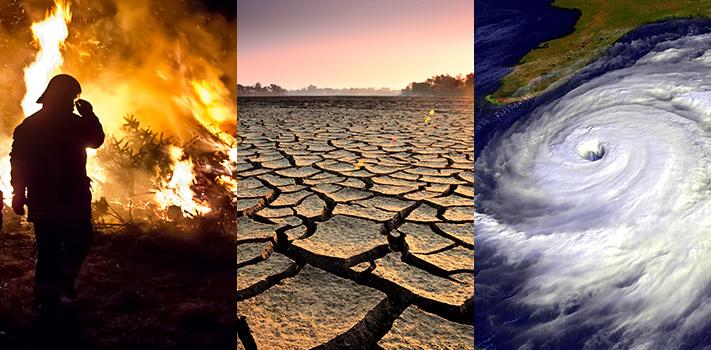Samuel Northrup, Editor-in-Chief
The United Nations International Panel on Climate Change (IPCC) revealed on Oct. 8 that the world is on pace to exceed global warming levels of 1.5 degrees Celsius, equal to 2.7 degrees Fahrenheit, as soon as 2030.
While still harmful to natural ecosystems and the environment, an average global temperature of 1.5 degrees Celsius above pre-industrial levels would be significantly less harmful than if it were to reach 2 degrees Celsius or higher. However, keeping global warming from exceeding 1.5 degrees Celsius would require “rapid and far-reaching transitions in energy, land, urban and infrastructure and industrial systems” the likes of which have never been seen before, the IPCC special report found.
“Limiting warming to 1.5 degrees Celsius is possible within the laws of chemistry and physics but doing so would require unprecedented changes,” Jim Skea, a co-chair of the working group on climate mitigation, said in an IPCC press release.
The report, which was prepared by 91 authors and review editors from around the world, is cause for alarm — but is Earth doomed?
Not exactly, explained Adam Schoonmaker, a professor of geology at Utica College.
“I think it has to get worse before it gets better because there’s so much money in [fossil fuels],” he said. “Exxon Mobil [and other fossil fuel companies] are some of the biggest corporations in the world. If politicians won’t start paying attention to that (climate change) until things get bad, then I don’t expect we’re going to achieve what the IPCC is hoping for.”
While Schoonmaker is not optimistic about humanity’s ability to curtail climate change and keep average global temperatures from exceeding 1.5 degrees Celsius above pre-industrial levels, he does believe in the international community’s ability to find a solution — “it’s just a matter of how bad it will get before we do solve it.”
“We really need to figure out a better way to power our society,” Schoonmaker said, “We need to come up with a way to power cars, trucks and airplanes. How would you get a Boeing 747 flying on batteries? We can’t fly a jumbo jet with solar electricity or electric battery packs, so we have to find an alternative [source of power]. And that’s where governments are going to have to get behind putting the money into labs and figure something out.”
While the U.N.’s report can be seen as a wake-up call for the world, the international collective of nations is limited in its power to enact the measures it deemed necessary in its climate change report, explained Professor of Government and Politics Jun Kwon.
“It is not easy to come up with collective action in politics,” Kwon explained. “The U.N. is sponsored by so-called experts and people involved in epistemic communities, scientists. They have the experts, policymakers do not. This means the U.N. is encouraging these scientists to make a report and try to provide reliable information so that leaders are trying to follow their advice.”
With the U.N. largely serving as an international forum, larger nations such as the United States, Russia, and China have the ability to influence smaller nations through political and economic means. With this dynamic in mind, this poses problems for the ability of the U.S. to influence international climate change policy following its withdrawal from the Paris Climate Agreement, Kwon said.
“[Withdrawing from the Paris Agreement] is not the right thing to do because it is placing the United States at odds with all other countries in the world,” Kwon explained. “The U.S. has been losing its soft power. I think China is taking a lead in terms of making awareness of environmental concerns. For the U.S., this is not good foreign policy, and this is not good for the world.”
Professor of Government Nathaniel Richmond is also optimistic about the ability of science and technology to prevent catastrophic global warming, but is “pessimistic it will be done.”
“I do think that small countries that are most threatened by this (global warming and rising sea levels) will want to address it, but the large countries like the United States probably won’t do anything until it’s a crisis, and maybe even too late,” Richmond said. “I think we will get around to doing it eventually and sensible policies will prevail, but it may be too late.”
The biggest challenge towards halting and reversing the effects of climate change is lack of political will in the international community, which is heavily influenced by the fossil fuel industry, Richmond explained.
According to the Center for Responsive Politics’ lobbying totals, the oil and gas industry spent $126.3 million in 2017, while Exxon Mobil spent over $11 million on its own, the highest total of any fossil fuel company that year.
“When you talk about climate change or environmentalism, the problem is that lobbyists are too powerful and their interests are too strong,” Richmond explained. “When fossil fuel companies begin to make a shift to renewables, then we’ll see some change.”


















![President Todd Pfannestiel poses with Jeremy Thurston chairperson Board of Trustees [left] and former chairperson Robert Brvenik [right] after accepting the university's institutional charter.](https://uticatangerine.com/wp-content/uploads/2023/10/unnamed.jpeg)




















































































































